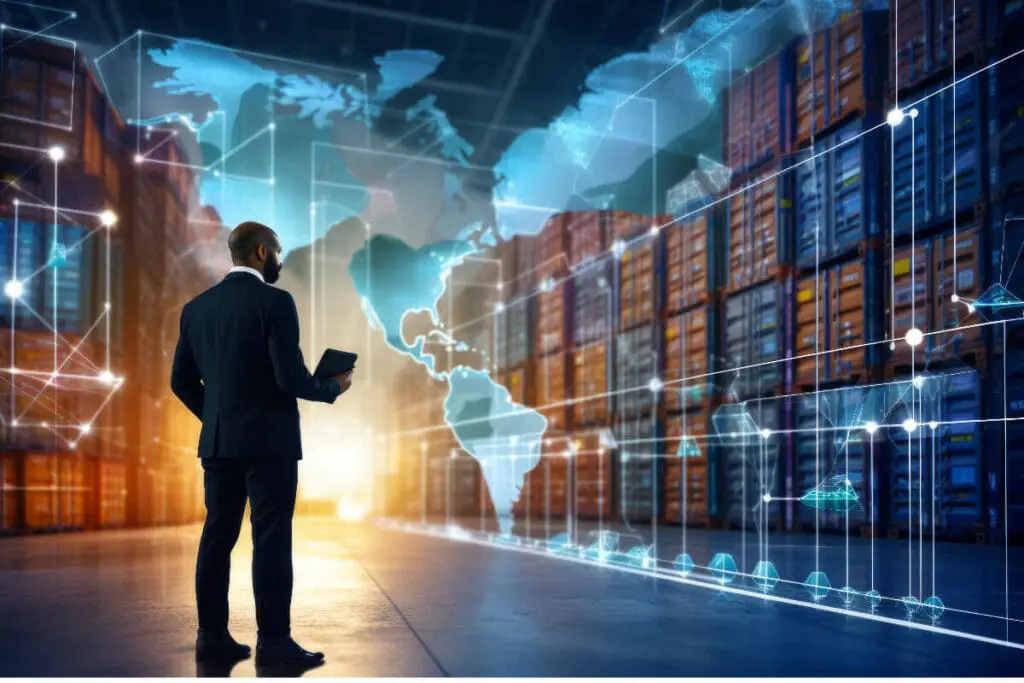Today, the world continues to get more and more interconnected. So much of what people buy is produced in another part of the world.
With the increasing globalization of trade and commerce, supply chains have expanded and become intricate. As the supply chain widens its reach, so does its vulnerability to potential threats and disruptions. This is where Global Supply Chain Security steps in, why companies need to look at this, and strategies to help them have a more secure supply chain.
Table of Contents
- Understanding Global Supply Chain Security In A Connected World
- 15 Comprehensive Strategies For Strong Global Supply Chain Security:
- Comprehensive Risk Assessments:
- Strategic Diversification:
- In-depth Supplier Audits:
- End-to-end Transparency:
- Thorough Security Training:
- Enhanced Physical Security:
- Fortified Digital Security:
- Tailored Insurance Policies:
- Collaborative Industry Partnerships:
- Redundant Systems Implementation:
- Adaptive Inventory Management:
- Rigorous Vendor Contracts:
- Routine Protocol Reviews:
- Scenario-based Contingency Planning:
- Engaged Stakeholder Communication:
- Frequently Asked Questions
- Related Content
Understanding Global Supply Chain Security In A Connected World
In our modern, interconnected global economy, companies increasingly rely on intricate supply chains that span continents. While this global network brings untold opportunities, it also introduces vulnerabilities. Enter the realm of Global Supply Chain Security.
What Is Global Supply Chain Security?
Global Supply Chain Security is an overarching discipline honing in on the risk management of a company’s external entities, which include suppliers, vendors, logistical partners, and transport providers. Its primary objective is not only the uninterrupted flow of goods but also to protect the firm’s tangible and intangible assets, reputation, and profit margins.

The focus of this security isn’t merely on physical threats; it extends to the digital realm, encompassing data breaches and cyber threats.
Given the critical nature of supply chains in a company’s operations, ensuring their security is paramount. Let’s delve into some comprehensive strategies that firms can employ to mitigate risks and enhance the security of their global supply chains.
15 Comprehensive Strategies For Strong Global Supply Chain Security:
Any company entrenched in the global supply chain must proactively strategize to safeguard all its assets. This underscores the indispensable nature of supply chain security.

Recognizing its pivotal role, we’ve delineated 15 strategies to bolster your supply chain’s security infrastructure.
Comprehensive Risk Assessments:
- Depth: Dive deep into potential vulnerabilities at every stage of the supply chain. This includes socio-political upheavals in supplier regions, natural disasters, potential transportation bottlenecks, strikes, and labor unrest.
- Frequency: Regular periodic evaluations ensure that new risks are promptly identified and addressed.
Strategic Diversification:
- Multiple Suppliers: Rather than leaning heavily on a single supplier, source materials or products from multiple providers to reduce dependency.
- Geographic Spread: Diversify the geographic regions from where you source or route your supplies. It guards against regional disruptions affecting the entire supply chain.
In-depth Supplier Audits:
- Standards Adherence: Ensure suppliers maintain quality, ethical, and security standards that align with your company’s values and regulatory requirements.
- On-site Evaluations: Physical visits can reveal security lapses or potential improvements that remote assessments might miss.
End-to-end Transparency:
- Real-time Tracking: Use advanced technological tools that offer real-time monitoring of goods in transit.
- Open Communication Channels: Maintain open lines with suppliers, transporters, and other stakeholders for faster issue resolution.
Thorough Security Training:
- Holistic Programs: Include everyone, from top-tier management to on-ground staff. Everyone is a link in the security chain.
- Regular Updates: Refreshers and updates based on new threat intelligence are crucial.
Enhanced Physical Security:
- Infrastructure: Reinforce warehouses and transportation hubs with security barriers, alarms, and surveillance systems.
- Personnel: Employ trained security personnel and conduct regular drills to prepare for potential scenarios.
Fortified Digital Security:
- Proactive Measures: Implement advanced firewalls, intrusion detection systems, and end-to-end encryption.
- Regular Audits: Periodically assess digital systems for vulnerabilities and patch them.
Tailored Insurance Policies:
- Custom Coverage: Choose policies that cater to supply chain disruptions rather than generic business policies.
- Claim Preparation: Understand the claim process to expedite relief when required.
Collaborative Industry Partnerships:
- Shared Intelligence: Collaborate with businesses in your sector or related sectors to share threat intelligence.
- Joint Solutions: Sometimes, a collective response to threats can be more effective.
Redundant Systems Implementation:
- Backup Suppliers: For crucial components, have alternative suppliers ready.
- Alternate Routes: Pre-plan alternative transportation routes and methods in case of disruptions.
Adaptive Inventory Management:
- Safety Stocks: While lean inventory reduces costs, maintaining a safety stock for critical components can be a lifesaver during disruptions.
- Demand Forecasting: Utilize advanced tools for more accurate demand prediction, aiding inventory management.
Rigorous Vendor Contracts:
- Security Clauses: Explain security expectations, repercussions of breaches, and responsibilities during disruptions.
- Regular Re-evaluations: As the business landscape evolves, revisit contracts to ensure they remain relevant.
Routine Protocol Reviews:
- Feedback Integration: Staff feedback can provide valuable insights. Regularly incorporate this feedback into protocol refinements.
- External Expert Consultations: Engage with third-party experts to ensure protocols align with industry best practices.
Scenario-based Contingency Planning:
- Role-playing: Simulate different disruption scenarios and test the company’s response mechanism.
- Actionable Insights: Gather learnings and refine the action plans after each simulation.
Engaged Stakeholder Communication:
- Regular Updates: Keep all stakeholders informed about potential risks and the steps being taken.
- Feedback Loops: Allow stakeholders to communicate their concerns or suggestions.
In the grand tapestry of global commerce, supply chains are the threads binding everything together. While they might seem just logistical, they’re vital lifelines. Ensuring their security isn’t just about safeguarding goods in transit but also about guaranteeing the very life of the business.

As threats evolve, so must our strategies, and only through vigilant and proactive measures can companies ensure an unhindered, secure flow through their global supply chains.
At Mondoro, we constantly look at all these for supply chain security. As we understand, as we do this, it also helps our clients know that we are looking over them and helping them with their global supply chain security.
If you are interested in seeing how Mondoro can help you with your supply chain – we would love to talk to you about how we can help you and be part of your global supply chain.
Find out more about how Mondoro can help you create, develop, and manufacture excellent home decor and home furniture products – don’t hesitate to contact me, Anita. Check out my email by clicking here or become a part of our community and join our newsletter by clicking here.
Mondoro gives out a FREE Lookbook to anyone interested. You can receive a copy of our latest Lookbook by clicking here.
Listen to our Podcast called Global Trade Gal. You can find it on all major podcast platforms. Try out to listen to one of our podcasts by clicking here.
Subscribe to our Mondoro Company Limited YouTube Channel with great videos and information by clicking here.
Frequently Asked Questions
What is Global Supply Chain Security?
Global Supply Chain Security refers to the measures and practices implemented to safeguard the integrity and resilience of supply chains on a global scale, protecting them from various threats and disruptions.
Why is Global Supply Chain Security important?
In an interconnected world, disruptions in the supply chain can have cascading effects on businesses. Global Supply Chain Security is essential for minimizing risks and ensuring the continuity of operations.
What are the common threats to global supply chains?
Threats include natural disasters, geopolitical tensions, cyberattacks, terrorism, and pandemics. These events can disrupt the production, transportation, and distribution of goods.
How does globalization contribute to supply chain vulnerabilities?
Globalization increases the complexity of supply chains, involving multiple countries and dependencies. This complexity amplifies the impact of disruptions and makes supply chains more susceptible to risks.
How can companies assess the security of their supply chain?
Companies can conduct risk assessments, evaluate vulnerabilities, and implement security measures. Collaboration with suppliers and stakeholders is crucial for a comprehensive understanding of the supply chain landscape.
What role do regulations play in Global Supply Chain Security?
Governments and international bodies have introduced regulations to enhance supply chain security. Compliance with these regulations helps companies adopt standardized practices to mitigate risks.
How does technology contribute to supply chain security?
Technologies like blockchain, IoT, and AI play a vital role in enhancing supply chain visibility, traceability, and security. These tools provide real-time data, enabling quicker response to disruptions.
Can insurance mitigate the impact of supply chain disruptions?
Yes, supply chain insurance can help companies recover financial losses resulting from disruptions. However, it is not a substitute for comprehensive risk management and security measures.
How does climate change affect Global Supply Chain Security?
Climate change can lead to more frequent and severe natural disasters, impacting the transportation and production of goods. Companies need to consider climate-related risks in their supply chain security strategies.
How can small businesses improve their supply chain security?
Small businesses can enhance security by building strong relationships with suppliers, diversifying sources, investing in technology, and staying informed about global events affecting supply chains.
Related Content
Overcoming 4 Obstacles In Global Supply Chain Coordination
Four significant obstacles need to be addressed: performance indicators, data sharing, pricing obstacles, and operation obstacles. If you understand these obstacles, you can learn how to address each of them and overcome them in your global supply chain. Read on as we explore these obstacles and how to overcome them in your supply chain.
You can learn more by reading Overcoming 4 Obstacles In Global Supply Chain Coordination by clicking here.
How Does Information Sharing Affect Supply Chain Performance?
Information equates to both time and money. Miscommunication or lacking vital information can lead to delays, increased costs, and challenges. Join us as we delve deeper into the indispensable nature of sharing information and effective communication in the supply chain landscape.
By clicking here, you can learn more by reading our blog, How Does Information Sharing Affect Supply Chain Performance?
How AI Technology Is Revolutionizing The Global Supply Chain?
There are many ways that AI will impact the global supply chain. AI’s influence in the supply chain domain is profound, from enhancing operational efficiencies and curtailing costs to elevating customer satisfaction. Read on as we explore the facets of the supply chain that AI will revolutionize and understand their significance.
You can learn more by reading our blog, How AI Technology Is Revolutionizing The Global Supply Chain? by clicking here.


